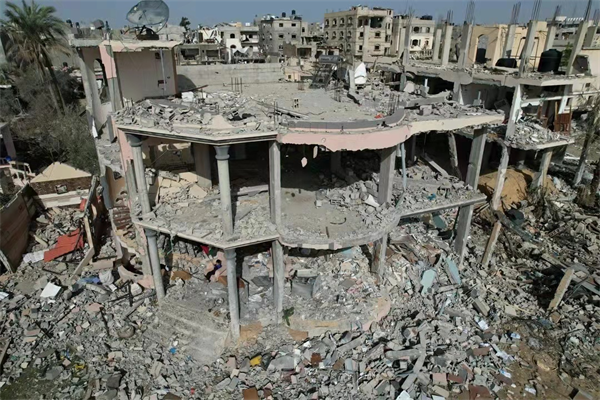
On November 27th local time, Qatari Foreign Ministry spokesperson Ansari announced that the Palestinian Islamic Resistance Movement (Hamas) and Israel have agreed to extend the previously reached temporary ceasefire agreement by two days. Earlier, at 7am local time on the 24th, the ceasefire agreement between Hamas and Israel in the Gaza Strip officially came into effect, with a total duration of 4 days.
With the joint efforts of multiple parties around the world, although the two sides have temporarily reached a ceasefire, the conflict between Palestine and Israel seems to be endless in the current situation and the long run. According to recent reports from multiple media outlets, this round of conflict has resulted in over 15900 deaths on both sides and countless people being displaced. In today's world where peace and development should have already become the mainstream, this number is particularly heartbreaking.
Although the current conflict between Palestine and Israel is concentrated in the Gaza Strip, due to its long duration, high number of casualties, and significant losses, from an economic perspective alone, its impact is far more than just on both sides, but has a profound impact on the world.
Let's first look at the Palestinian side. The report from the Palestinian Economic Policy Research Institute, headquartered in Ramallah on the West Bank of the Jordan River, states that the unemployment rate in the Gaza Strip has been around 45% over the past decade, but now it is close to 100%. A think tank strategist also stated that the current conflict has almost paralyzed the Gaza economy.
In late October, the United Nations Conference on Trade and Development released a report stating that the Gaza Strip economy had been "hollowed out" for many years. As of early October, approximately 80% of the population relied on international aid to survive, and the impact of the new round of Palestinian Israeli conflict on the local economy was even more difficult to estimate.
Due to the escalating tension between Palestine and Israel, the peace process has been stalled for a long time. 2022 is one of the worst years for Palestine's economy in recent years. In 2022, the per capita GDP of Palestine was only 8% of Israel's, close to the lowest level since 1994, while trade with Israel accounted for 72% of Palestine's total trade volume. Therefore, since the serious conflict between Palestine and Israel, the economic situation in Palestine can be imagined.
From the Israeli perspective. Israel, as an important link in the global supply chain and a crucial node in the Middle East, is being negatively impacted by military conflicts on the global economy through global trade networks and commodity markets.
According to the United Nations Commodity Trade Statistics Database, Israel's main export products include electronic components, precious metals, pharmaceuticals, mechanical products, chemical products, etc. Among them, Israel's strong industries such as chips, potassium fertilizers, and pharmaceuticals, which have weaker global substitutability, have the greatest impact on the global supply chain.
It is reported that Israel, which currently has nearly 200 chip companies and more than 30 chip research and development centers, plays a very important role in the global semiconductor industry: almost all chip manufacturers, including Intel, Apple, Samsung, Google, and Bosch, have production bases or research and development centers in Israel.
Therefore, on the surface, the current round of Palestinian Israeli conflict has not completely torn apart the global supply chain, but it does not mean that the global supply chain has not been affected by the conflict.
For example, although Israel's potassium fertilizer export hub Ashdod Port and Tel Aviv's Gurion International Airport have not closed, the fact that trade costs are rapidly rising cannot be ignored.
In addition to exacerbating the cost of global trade at the technological level, it is also seen by the outside world as a potential new risk in accelerating the trend of de globalization. Regarding this, international economist McKenna from Wells Fargo Bank stated that the Israeli Palestinian conflict may become another catalyst for de globalization, although its impact on global economic globalization is still difficult to determine.
At the same time, the conflict between Palestine and Israel has brought new uncertainties to the global economy and trade affected by the Russia Ukraine conflict, seriously damaging market confidence and hindering global efforts to curb inflation. "As WTI crude oil futures approach $90 again, we are facing the risk of a third wave of inflation," said George Lagaria, Chief Economist of multinational consulting firm Maze Consulting
If the Israeli Palestinian conflict spirals out of control and leads to a sustained increase in oil prices, it will further increase inflationary pressure in the United States and globally, leading to a comprehensive systemic financial crisis and affecting the stability of the money supply and financial system.
On November 27th local time, delegations from EU member states and Middle East and North African countries held the Mediterranean Union Forum in Barcelona, Spain. The Arab and EU countries attending the meeting unanimously believe that the "two-state solution" is the answer to resolving the Palestinian Israeli conflict. In today's world where attention is focused on the situation between Palestine and Israel, the public is eagerly anticipating a reasonable solution to the conflicts in the Middle East, especially between Palestine and Israel.

报告显示,中国电力投资加速增长,预计2024年电网基建投资将超过5300亿元。
近日,市场迎来了一则引人注目的消息:工业巨头3M公司(MMM.N)在本周五公布了其季度业绩报告,随后股价飙升至近两年来的
最近,外媒给OpenAI算了笔账,今年可能要血亏50亿美元。
近日,巴黎奥运会和世界铁人三项协会联合发布了一项重大决定,宣布因塞纳河水质污染问题,原定于近期进行的奥运会铁人三项首次下
当地时间7月18日,法国巴黎发生了一起令人震惊的持刀袭警事件。
近期,一则重大消息在国际舞台上引起轩然大波,马来西亚宣布加入金砖国家。
调查发现,互联网和智能手机的使用干扰了韩国近五分之一学生的生活。